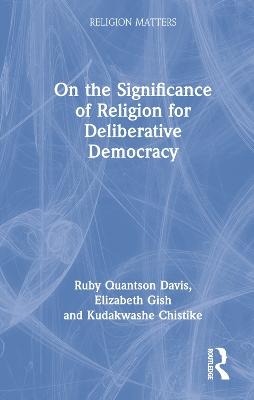
On the Significance of Religion for Deliberative Democracy
Routledge (Verlag)
978-1-032-10215-3 (ISBN)
This exciting volume pioneers the study of the complex relationship between religion and deliberative democracy, a practice that places importance on the need for citizens to come together to identify shared concerns and issues, work through choices and options for action, weigh consequences and trade-offs, and possibly take collective action to influence decisions and policies.
Chapters use case studies to demonstrate instances where deliberative democracy has advanced the positive role of religion and where religious practices have advanced the role of deliberative democracy. The authors look at the actions of various denominations of Christianity in Africa, the United States of America, and the South Pacific, as well as examining how such groups operate within the context of indigenous religions such as African Traditional Religion. This volume also explores instances where the absence of deliberative practices in religion has curtailed the ability of people to realise their full potential, and the ability of religious groups to act decisively for the common good to influence the politics of the times.
Combining innovative research with case studies and practical implications and recommendations for religious leaders, academics, policy makers, and practitioners, this concise and easily accessible volume instructs on how religious and democratic institutions can symbiotically address community and national challenges.
Ruby Quantson Davis is a peace and development specialist, an Associate Member of Wesley House Cambridge, UK, faculty member of the Deliberative Democracy Institute and former Fellow and Resident Scholar of the Kettering Foundation in the United States. Elizabeth Gish is currently Program Officer at the Kettering Foundation. Previously Associate Professor, Department of Philosophy and Religion, Western Kentucky University, USA. Kudakwashe Chitsike is a lawyer and consultant on a sexual violence and global health investigation in Zimbabwe.
Summary Recommendations and Implications for Policy Makers, Religious Leaders, Researchers and Practitioners Introduction: Religion and Deliberative Democracy: An Interface of Practices 1. Deliberative Democracy and Religion as Practices: Problems and Potentials 2. Case Study 1: Religious Spaces and Gender-Based Violence: A Deliberative Approach to Voicing our Pain 3. Case Study 2: "Gyae ma ne nka" (Let It Be): A Religious Notion of Peace or a Shutdown of Democratic Conversations? 4. Case Study 3: Church, Charity, and Philanthropy: Deciding Faith-Based Actions Democratically Now What? Recommendations and Implications for Policy Makers, Religious Leaders, Researchers, and Practitioners
| Erscheinungsdatum | 08.02.2023 |
|---|---|
| Reihe/Serie | Religion Matters |
| Verlagsort | London |
| Sprache | englisch |
| Maße | 129 x 198 mm |
| Gewicht | 400 g |
| Themenwelt | Geisteswissenschaften ► Geschichte |
| Geisteswissenschaften ► Philosophie | |
| Geisteswissenschaften ► Religion / Theologie | |
| Sozialwissenschaften ► Politik / Verwaltung ► Politische Systeme | |
| ISBN-10 | 1-032-10215-2 / 1032102152 |
| ISBN-13 | 978-1-032-10215-3 / 9781032102153 |
| Zustand | Neuware |
| Haben Sie eine Frage zum Produkt? |
aus dem Bereich


